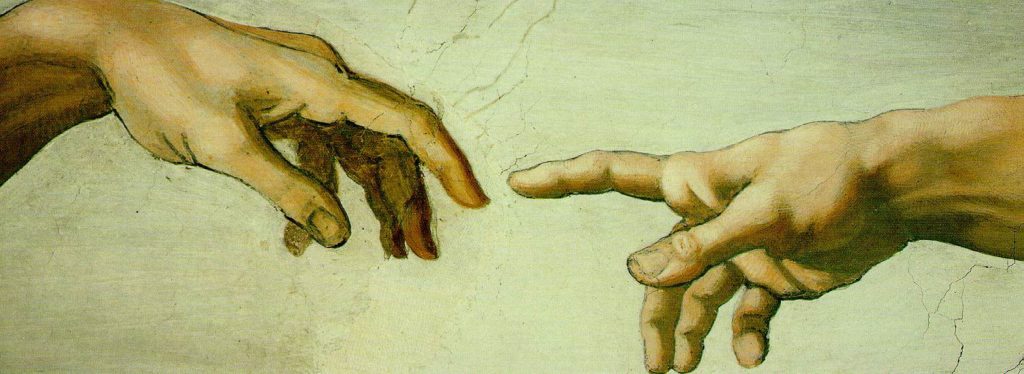 In the last post, we saw how we humans evolve to think of God as a being that exists outside of ourselves. It’s a very understandable process, but, as we will see, it’s not the way Jesus, Paul, or many of our saints imagined God.
In the last post, we saw how we humans evolve to think of God as a being that exists outside of ourselves. It’s a very understandable process, but, as we will see, it’s not the way Jesus, Paul, or many of our saints imagined God.
It is a very understandable process through which we conclude that there is me, there is you, there is everything, and now, there is God; all separate; all discreet packages of otherness.
 As we saw in the last post, Divine Ultimacy being ultimate, it must be bigger than everything. Our Divine framework is one of separateness with God existing outside of everything, and “over there.”
As we saw in the last post, Divine Ultimacy being ultimate, it must be bigger than everything. Our Divine framework is one of separateness with God existing outside of everything, and “over there.”
If we are neo-Platonists (as many of us were in the early years of our faith), we imagine the realm of “out there” where God exists, as the realm of immaterial perfection. God exists in the non-physical, non-corrupted, realm of forms. God is a perfect being, existing in a non-physical place that somewhere far away from here; certainly not here!
 So…
So…
I exist “over here,” and God exists “over there.” For me to experience God, then, one of us has to take a trip. Either I have to go over there, (when I die or have a mystical experience), or God has to come over here (a special visitation or incarnation).
This framework exists so deeply in our mental constructs it is difficult to hear anything that doesn’t fit in it. It is the lens through which we look at scripture. It is the given we don’t question when we explore the spiritual life.
It has been our shared history to reject, ignore, or marginalize any spiritual thoughts that go counter to this framework. And there’s a lot of stuff in our scriptures and tradition that don’t fit.
Jesus invites us to experience our oneness with God (Jn. 17) the same way he does, but we can’t image what that means if God exists in a realm far, far away. Without a framework to process his words, we simply ignore them.
 Our scriptures insist that the Spirit of God animates our very beings. “Filled with the Spirit” is such a ubiquitous term, that we say the words all the time. However, when we do, we usually imagine the Spirit coming from somewhere outside of us; a dove that lands on us – and then flies away. It is difficult to let the term shape our spiritual journeys because it feels at odds with our “God-out-there-invading-here” framework.
Our scriptures insist that the Spirit of God animates our very beings. “Filled with the Spirit” is such a ubiquitous term, that we say the words all the time. However, when we do, we usually imagine the Spirit coming from somewhere outside of us; a dove that lands on us – and then flies away. It is difficult to let the term shape our spiritual journeys because it feels at odds with our “God-out-there-invading-here” framework.
The contemplatives of our tradition speak of a connection between self and the Divine that is inextricable. But it is difficult to hear or embrace their call to experiential intimacy. The galactic distance between us and God is just too vast.
In the next post, we’ll imagine together a different metaphor for God. If our starting place is not an “out there” one, it changes everything.
Not to be picky, but I think you left out a word in the 9th paragraph, second sentence. Maybe “use” or somesuch….?
And you are right, I think. The FACT of God in me is an interesting new idea, but to EXPERIENCE God in me is life-changing in a way that I have no words to describe.
thank you. typo-correction is always welcome. i’ll go fix it.
d.
When I had my “mystical” experience, a different kind of awareness suddenly filled my mind, but the “suddenly” was not a part of my awareness, kind of like in a dream where the scene shifts abruptly but is accepted as the normal flow of events. Afterwards, I thought of this awareness as coming to me, but maybe it came from within – wow! And when it left me, I was acutely conscious of a sense of it drifting away – as if it were a cloud of mist on a light breeze.